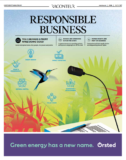
Bron
FMO
Impact investing, combining finance with sustainability, has been around since the 1940s, but in the last few years demand has strengthened as the environment reaches a crunch point. Policy-makers are now piling pressure on the private sector and the desire for positive investments is reaching a peak.
“A highly effective opportunity to improve the planet, while securing an attractive return, is proving essential for smart investors.”
Some $22 billion was invested last year in impact projects, according to the Global Impact Investing Network. Ninety one per cent of last year’s projects equalled or bettered expected fnancial returns, and European development banks alone calculate that in a year they created four million jobs and $11 billion in local tax revenue
Impact investing is paving the way by allowing investors to change their behaviour. They are collaborating with fast-growing partners for a two-way gain and playing an essential part in supporting local sustainable development goals.
So far, investors have made a neareven split of equity and loan investments, and the big focus has been in fnance and infrastructure, as well as manufacturing, and agricultural and service businesses, according to the Association of European Development Finance Institutions (EDFI).
Impact investing’s model is different from other sources of fnance. “Impact investment banks will push capital into places where traditional investors have found it difcult, paving the way for future growth. We can open up markets for investors and for our commercial banking partners, while helping local businesses and their communities to prosper,” says Jürgen Rigterink, chief executive at Dutch development bank FMO. “As well as our expectation of healthy returns, we have an equally clear demand for sustainability and social development.”
Read the full article in Raconteur’s special report in The Times and The Sunday Times



